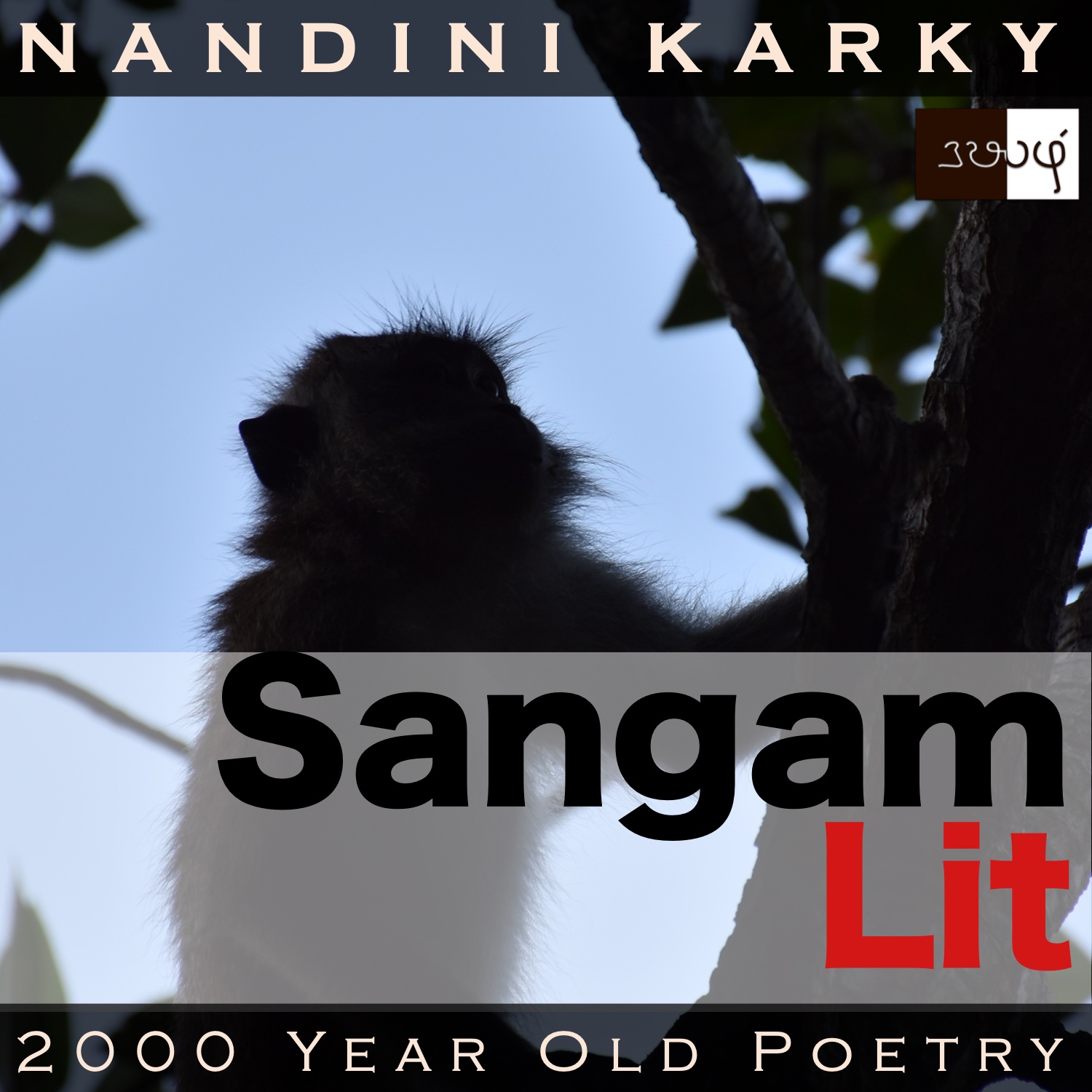Podcast: Play in new window | Download
Subscribe: Apple Podcasts | Spotify | Amazon Music | Android | iHeartRadio | TuneIn | RSS | More

In this episode, we relish scenes from the wild in a mountain country, as depicted in Sangam Literary work, Kurunthogai 385, penned by Kabilar. Set in the hills of ‘Kurinji’, the verse speaks in the voice of the lady to the confidante, subtly requesting the friend to reveal the lady’s relationship to her kith and kin.
பலவில் சேர்ந்த பழம் ஆர் இனக் கலை,
சிலை விற் கானவன் செந் தொடை வெரீஇ
செரு உறு குதிரையின் பொங்கி, சாரல்
இரு வெதிர் நீடு அமை தயங்கப் பாயும்
பெரு வரை அடுக்கத்துக் கிழவோன் என்றும்
அன்றை அன்ன நட்பினன்;
புதுவோர்த்து அம்ம, இவ் அழுங்கல் ஊரே.
‘Strangers in town’ is the core concept here. The opening words ‘பலவில் சேர்ந்த பழம்’ meaning ‘fruit hanging from the jackfruit tree’ brings before our eyes this wild delicacy. In ‘இனக் கலை’ meaning ‘a group of monkeys’, we see the animal representatives of this domain. Moving the scene to a different spot, the verse then gives a glimpse of ‘செரு உறு குதிரை’ meaning ‘a horse in a battlefield’. Deep faith in the love of another echoes from ‘என்றும் அன்றை அன்ன நட்பினன்’ meaning ‘he always has the same love he had at first’. Ending with the words ‘புதுவோர்த்து அம்ம இவ் அழுங்கல் ஊரே’ meaning ‘unknown people are here in this clamorous town’, the verse echoes the core theme and welcomes us to understand more.
With jackfruits, monkeys and horses, the verse seems to be teeming with life. The context reveals that the man and lady were leading a love relationship and the man was trysting with the lady for a while. One day, the lady turns to her confidante and says, “Among a herd of monkeys feasting on the fruits of the jackfruit tree, one male monkey, fearing the unfailing arrows from the well-crafted hunter’s bow, akin to a horse in a battlefield, leaps high, and making huge and tall bamboos to sway, it pounces away, in the huge mountain ranges of the lord. Even though he has the same love as then, newcomers are to found in this uproarious town!” With these words, the lady is indirectly bidding the confidante to reveal the lady’s relationship with the man to the lady’s parents.
What could be wrong if there are a few strange faces in town? To understand, let’s delve into the lady’s words. The lady starts by zooming her lens on a well-endowed jackfruit tree. On this tree, a group of monkeys are hastily relishing that mouth-watering fruit. But soon, fearing the stream of arrows from the hunter’s bow, a male monkey pounces up in the air, in the image of a battle horse, and making tall bamboos dance, it rushes away. This entire narration is rendered to describe the man’s land. Moving on from the lay of his land to the love in his heart, the lady mentions how the man always has the same feelings for her, as when he first met and fell in love with her. While that is the case, how come strangers are in town, with the intent of seeking my hand in marriage, the lady wonders aloud.
So, the problem with these unknown faces striding around town is that they pose a danger to the lady’s love relationship with the man. For if the lady’s parents are impressed with their marriage proposal, the circumstances would turn dire for the lady. Saying this, the lady subtly nudges her friend to reveal the truth of her relationship to her parents. In the image of the monkey fearing the hunter’s arrow, the lady places a metaphor for her hope that the newcomer interested in marriage with her, would leave immediately, if the lady’s relationship with the man was revealed by the confidante. Through this verse, we understand that there were two modes of marriages in Sangam times, much similar to current Tamil society – one, being that of love marriages, and another, of marriages being arranged by families. If these Sangam verses are to be taken as the reality of that era, it was love marriages that took precedence then and were thought to be a virtuous mode of choosing one’s life partner.




Share your thoughts...